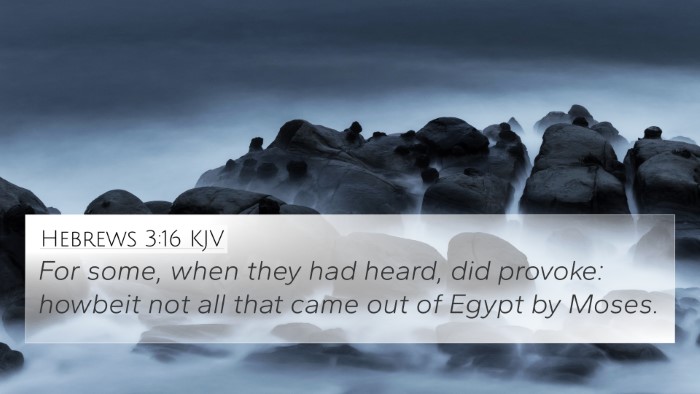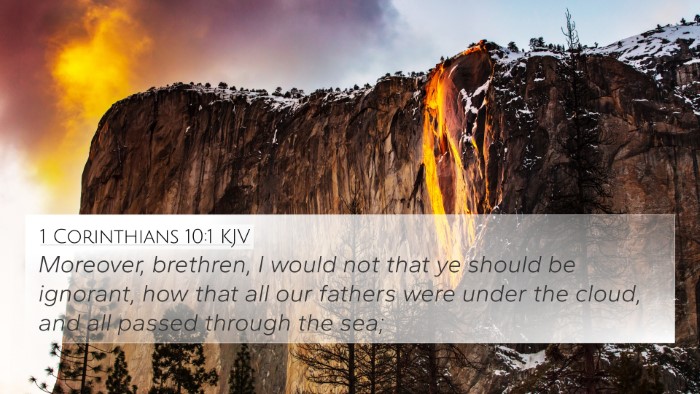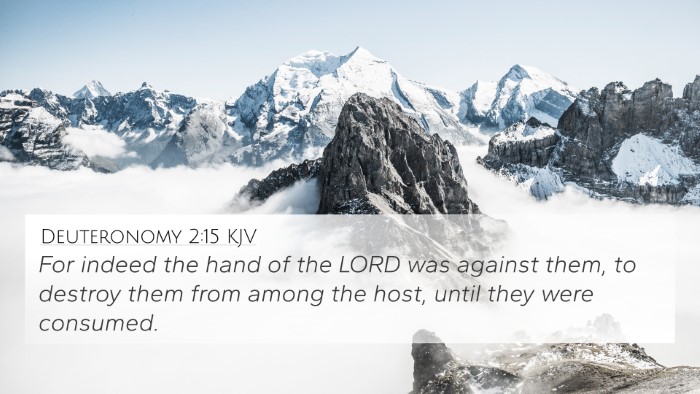Understanding Jude 1:5
The epistle of Jude primarily addresses the theme of contending for the faith and warns against false teachers. In verse 5, Jude reminds his readers of God's past judgments, particularly regarding the Israelites who were delivered from Egypt but later fell into disbelief.
Verse Text
Jude 1:5: "But I want to remind you, although you once knew this, that the Lord, having saved the people out of the land of Egypt, afterward destroyed those who did not believe."
Summary of Key Insights
- Historical Reminder: Jude draws on the history of Israel to illustrate a profound truth about faith and obedience.
- Salvation and Fall: The verse emphasizes that being saved does not guarantee eternal security; rather, faith must be maintained.
- Divine Judgment: It serves as a warning of God's judgment against those who fall away from faith.
Commentary Insights
Matthew Henry Commentary
Henry notes that Jude's purpose is to remind believers of past instances where God demonstrated both His saving power and His judgment against unfaithfulness. The reference to the Israelites illustrates how those who have experienced God's saving grace can still face dire consequences if they turn away.
Albert Barnes Commentary
Barnes emphasizes the duality of salvation and destruction reflected in this verse. He indicates that the Israelites' deliverance from Egypt was not the end of their journey; it was merely the beginning. Their ultimate failure to trust and obey God led to their downfall in the wilderness, highlighting the necessity of continual faith.
Adam Clarke Commentary
Clarke points out that Jude's admonition serves as a reminder of the continuity of God's character. He emphasizes that God not only saves but also holds individuals accountable for their faithfulness. The Israelites' example is one of warning, inspiring believers to heed Jude's call to contend earnestly for their faith.
Cross-References and Related Verses
- Hebrews 3:17: "But with whom was He grieved forty years? Was it not with those who sinned, whose corpses fell in the wilderness?"
- 1 Corinthians 10:5: "But with most of them God was not well pleased, for their bodies were scattered in the wilderness."
- Numbers 14:29: "The carcasses of you who have complained against Me shall fall in this wilderness."
- 2 Peter 2:4: "For if God did not spare the angels who sinned, but cast them down to hell and delivered them into chains of darkness, to be reserved for judgment."
- Matthew 7:21: "Not everyone who says to Me, 'Lord, Lord,' shall enter the kingdom of heaven, but he who does the will of My Father in heaven."
- Romans 11:22: "Therefore consider the goodness and severity of God: on those who fell, severity; but toward you, goodness, if you continue in His goodness."
- John 15:6: "If anyone does not abide in Me, he is cast out as a branch and is withered; and they gather them and throw them into the fire, and they are burned."
Thematic Connections
This verse establishes key themes that resonate throughout both the Old and New Testaments. It encapsulates the ideas of faithfulness, judgment, and accountability, forming significant connections between Bible verses. E.g., the links between Old Testament accounts and New Testament teachings underpin the theological significance of faithfulness amidst trials.
Practical Application
For modern readers, Jude 1:5 acts as a clarion call to evaluate one's faith and commitment. It is a reminder that salvation is just one part of the believers' journey—a continual adherence to faith and obedience is imperative. As Jude contextualizes the narrative of the Israelites, believers today can reflect on their paths and consider their spiritual vigilance.
Using Cross-References Effectively
Engaging in cross-referencing Biblical texts enriches one's understanding. Here are some tools for Bible cross-referencing:
- Bible Concordance: A tool listing words present in the Bible alongside their occurrences, helping locate verses.
- Bible Cross-Reference Guide: Resources that connect verses and themes, enhancing study and understanding.
- Bible Chain References: Systems that link related verses sequentially, allowing for thematic exploration.
Conclusion
In conclusion, Jude 1:5 serves as both a historical reminder and a pertinent warning about the necessity of faithfulness. The verse's significance is amplified through its connections with various scriptures and the overarching themes of salvation, judgment, and the need for perseverance in faith. This epistle's message remains crucial for contemporary believers, urging them to actively contend for their faith amid challenges.











